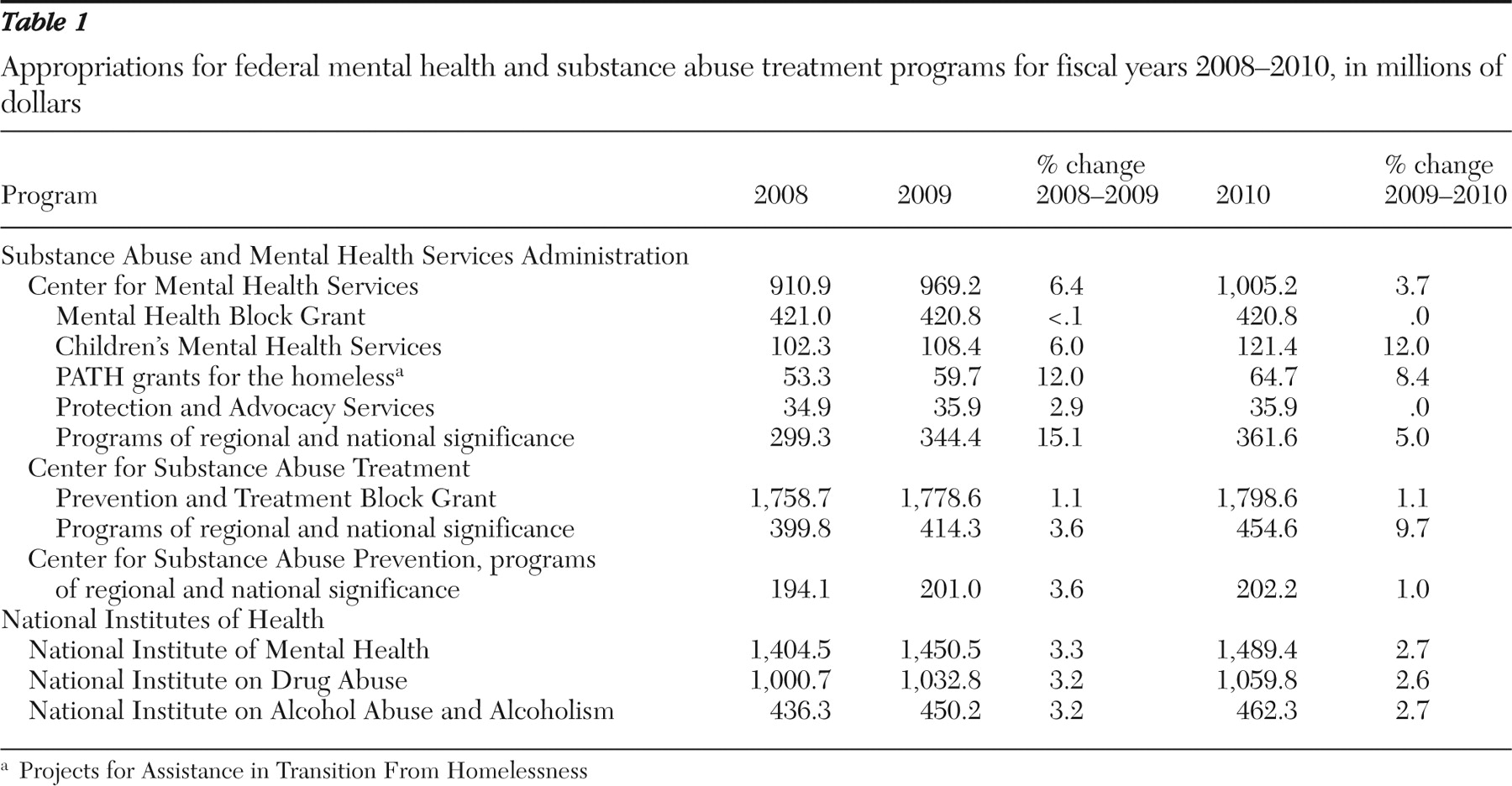For the second year in a row, federal mental health and substance abuse treatment agencies have seen funding increase for many programs—in some cases well beyond the amount requested by President Obama. The enhanced funds provided in the 2010 omnibus spending bill, which was signed by President Obama on December 16, 2009, are especially welcome as many states prepare to cut support for mental health programs during the ongoing recession.
Appropriations for the Center for Mental Health Services (CMHS) topped $1 billion for the first time (
Table 1 ). Congress doubled the administration's rquest for a $17 million increase and approved a $36 million increase. The largest percentage increase is for Children's Mental Health Services, which provides grants to states and localities to support the development of comprehensive community-based systems of care. In fiscal year 2010, this program is expected to serve more than 13,000 youths with serious emotional disturbances. Another critical CMHS program that garnered strong support in the 2010 budget (an 8.4% increase) is Projects for Assistance in Transition From Homelessness (PATH), which provides a flexible funding stream allowing local programs to use funds in ways most appropriate for their communities.
Among CMHS programs of regional and national significance, grants for Primary and Behavioral Health Care Integration received a substantial boost—funding was doubled from $7 million in 2009 to $14 million in 2010. The program seeks to improve the physical health status of people with serious mental illnesses by helping communities to integrate primary care services into publicly funded community mental health and other community behavioral health settings. Another program of regional and national significance to receive strong support was Project LAUNCH (Linking Actions for Unmet Needs in Children's Health), introduced in fiscal year 2008 at a funding level of $7.4 million. The 2010 appropriation more than triples support for this program ($25 million), which is designed to promote wellness of children up to eight years of age by addressing physical, emotional, social, and behavioral aspects of their development.
The substantial increases of the past two years were achieved after more than five years of Bush administration funding that either remained flat—in the case of the Substance Abuse and Mental Health Services Administration—or failed to keep up with the rate of inflation—in the case of the National Institutes of Health (NIH).
For fiscal year 2010 Congress exceeded the Obama administration's request for a 2% increase in the NIH budget and provided $31 billion, or 2.3% more than in 2009.
At nearly $1.49 billion, funding in 2010 for the National Institute of Mental Health (NIMH) is $38.9 million higher than in 2009. In 2009 the American Recovery and Reinvestment Act provided NIMH with an additional $366 million. "In a typical year, NIMH invests $180 million in new research grants," noted NIMH Director Thomas Insel, M.D., in an end-of-year blog (
www.nimh.nih.gov/about/director ). "With [Recovery Act funds] the Institute was able to jumpstart many of the goals of the NIMH Strategic Plan, the Interagency Autism Coordinating Committee's Strategic Plan for Autism Spectrum Disorder Research, the NIH AIDS Strategic Plan, and the National Advisory Mental Health Council's report on research training." In his January blog, Dr. Insel said that the 2.7% increase "should allow us to fund between 15% and 20% of applications." The 2010 NIH budget includes similar percentage increases for the National Institute on Drug Abuse and the National Institute on Alcohol Abuse and Alcoholism.
A 2010 appropriation of $100 million for Second Chance Act programs, which are overseen by the Justice Department, quadruples the 2009 funding level of $25 million and reflects robust support for programs that affect the lives of people with serious mental illness. The Second Chance Act, which became law in April 2008, is designed to improve outcomes for people returning to the community from prisons and jails by providing grants to government and nonprofit agencies for employment assistance, substance abuse treatment, housing, family programming, mentoring, victim support, and other services that help reduce recidivism. More information on key Department of Justice appropriations that will help meet the needs of people with mental illness in 2010 is available on the Web site of the Justice Center of the Council of State Governments (
www.justicecenter.csg.org ).


